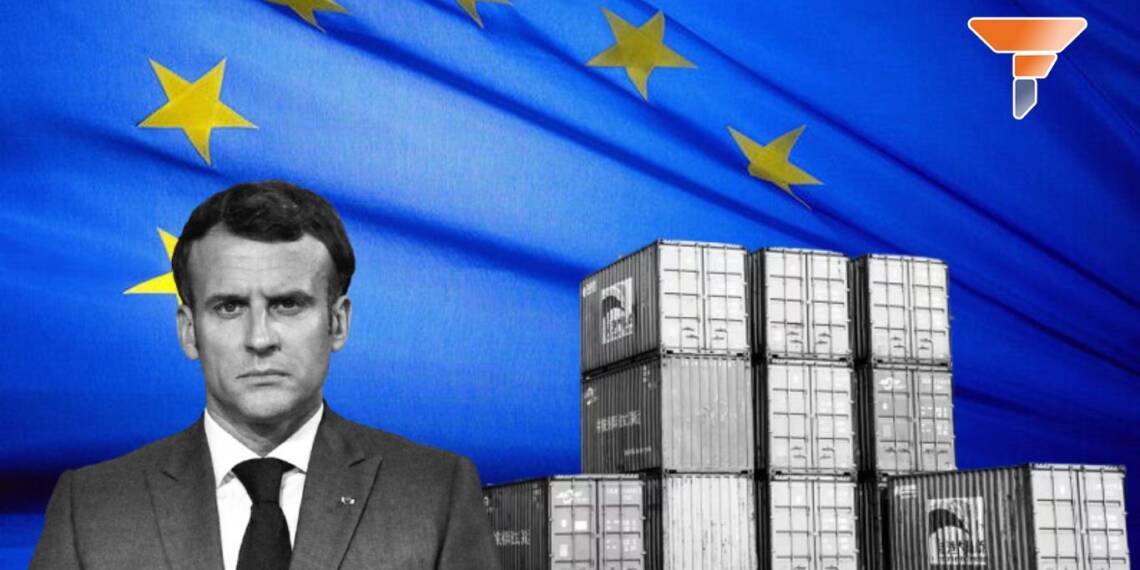French President Emmanuel Macron has called on French and European companies to suspend all future investments in the US in response to a sweeping new wave of tariffs imposed by US President Donald Trump. Describing the 20 % levies on European imports as “brutal and unfounded,” Macron warned of a severe impact on the European economy and also urged a united European front.
On Thursday, Macron attended an emergency meeting at the Élysée Palace with French ministers, Prime Minister François Bayrou, and affected industry leaders to talk about the situation. During the meeting, he said, “Future investments, investments announced in the last weeks, should be suspended for a time for as long as the situation with the United States is not clarified.”
Trump’s April 2 tariff has escalated transatlantic trade tensions, with Washington imposing 20 % tariffs on nearly 70% of European exports, including steel, aluminium, cars, pharmaceuticals, semiconductors, timber, and consumer goods like wine, clothing, and chewing gum. The move also for France’s overseas territories with separate tariffs, a decision Overseas Minister Manuel Valls decried as “deeply political” and riddled with “inconsistencies and absurdities.”
Macron accused the US of launching an economic offensive that would leave Americans “weaker and poorer” while creating a “massive impact” on European industry. Underlining the need for collective solidarity, he warned against unilateral European responses and reaffirmed France’s commitment to an EU-wide strategy.
The French president outlined a two-stage European response: the first, due in mid-April, will tackle the existing US tariffs on steel and aluminium; the second, set for late April, will present a broader retaliation package after assessing affected sectors and finalizing coordination among EU member states.
“We are not naïve. We are going to protect ourselves,” Macron said, referencing recent EU duties on Chinese vehicles as a model of how the bloc could step up pressure. “We must accelerate trade defence mechanisms and consider deploying the EU’s anti-coercion instrument — even against the United States,” he added, while also hinting at possible actions targeting US Big Tech firms.
French investments in the US were valued at $370 billion in 2023, making France the fifth-largest foreign investor, according to US data. Over 4,200 subsidiaries of French companies operate in America, employing approximately 741,000 people. US direct investment in France stood at $142 billion the same year, heavily concentrated in manufacturing.
Macron’s remarks are also seen as a message to French business magnates. Earlier this year, Bernard Arnault of LVMH expressed interest in expanding investment in the US, praising Trump’s economic policies, while shipping giant CMA CGM announced a €20 billion US investment plan. Macron’s comments aim to prevent private deals that could undercut EU unity.
EU preparing measures?
In Brussels, the European Union is finalizing its response. A preliminary list of US products to be hit by retaliatory tariffs — ranging from meat and cereals to vacuum cleaners and dental floss — will be proposed on Monday. EU trade ministers are set to meet in Luxembourg to coordinate strategy, with formal approval of countermeasures expected Wednesday. These would be rolled out in two stages — mid-April and mid-May — unless blocked by a qualified majority.
While France champions a tough line, other nations, including Ireland and Italy, advocate a more measured approach. One EU diplomat summed up the dilemma: “We can’t be too soft or we lose leverage, but too harsh a response risks escalation.”
As trade tensions rise, the global economy braces for turbulence. “The world is reorganizing,” Macron said. “And Europe must do so too — with clarity, unity, and strength.”
Markets around the world, from the US to Asia to Africa, have seen a crash affecting businesses and common people worldwide. The future looks more precarious as protectionist economic policies will take centre stage in the world economic domain, and retaliatory tariffs will make the situation worse in the coming months.








